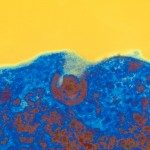Link to Pubmed [PMID] – 17404267
J. Immunol. 2007 Apr;178(8):4865-75
Comparison of TCRalphabeta repertoires of myelin oligodendrocyte glycoprotein (MOG)-specific T lymphocytes in C57BL/6 and TdT-deficient littermates (TdT(-/-)) generated during experimental autoimmune encephalomyelitis (EAE) highlights a link between a diversified TCRalphabeta repertoire and EAE relapses. At the onset of the disease, the EAE-severity is identical in TdT(+/-) and TdT(-/-) mice and the neuropathologic public MOG-specific T cell repertoires express closely similar public Valpha-Jalpha and Vbeta-Jbeta rearrangements in both strains. However, whereas TdT(+/+) and TdT(+/-) mice undergo successive EAE relapses, TdT(-/-) mice recover definitively and the lack of relapses does not stem from dominant regulatory mechanisms. During the first relapse of the disease in TdT(+/-) mice, new public Valpha-Jalpha and Vbeta-Jbeta rearrangements emerge that are distinct from those detected at the onset of the disease. Most of these rearrangements contain N additions and are found in CNS-infiltrating T lymphocytes. Furthermore, CD4(+) T splenocytes bearing these rearrangements proliferate to the immunodominant epitope of MOG and not to other immunodominant epitopes of proteolipid protein and myelin basic protein autoantigens, excluding epitope spreading to these myelin proteins. Thus, in addition to epitope spreading, a novel mechanism involving TCRalphabeta repertoire diversification contributes to autoimmune progression.

